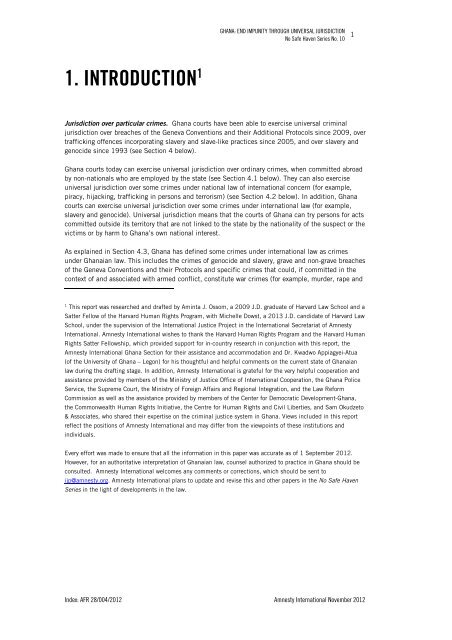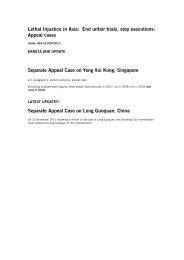Ghana - Amnesty International
Ghana - Amnesty International
Ghana - Amnesty International
You also want an ePaper? Increase the reach of your titles
YUMPU automatically turns print PDFs into web optimized ePapers that Google loves.
GHANA: END IMPUNITY THROUGH UNIVERSAL JURISDICTIONNo Safe Haven Series No. 1011. INTRODUCTION 1Jurisdiction over particular crimes. <strong>Ghana</strong> courts have been able to exercise universal criminaljurisdiction over breaches of the Geneva Conventions and their Additional Protocols since 2009, overtrafficking offences incorporating slavery and slave-like practices since 2005, and over slavery andgenocide since 1993 (see Section 4 below).<strong>Ghana</strong> courts today can exercise universal jurisdiction over ordinary crimes, when committed abroadby non-nationals who are employed by the state (see Section 4.1 below). They can also exerciseuniversal jurisdiction over some crimes under national law of international concern (for example,piracy, hijacking, trafficking in persons and terrorism) (see Section 4.2 below). In addition, <strong>Ghana</strong>courts can exercise universal jurisdiction over some crimes under international law (for example,slavery and genocide). Universal jurisdiction means that the courts of <strong>Ghana</strong> can try persons for actscommitted outside its territory that are not linked to the state by the nationality of the suspect or thevictims or by harm to <strong>Ghana</strong>’s own national interest.As explained in Section 4.3, <strong>Ghana</strong> has defined some crimes under international law as crimesunder <strong>Ghana</strong>ian law. This includes the crimes of genocide and slavery, grave and non-grave breachesof the Geneva Conventions and their Protocols and specific crimes that could, if committed in thecontext of and associated with armed conflict, constitute war crimes (for example, murder, rape and1This report was researched and drafted by Aminta J. Ossom, a 2009 J.D. graduate of Harvard Law School and aSatter Fellow of the Harvard Human Rights Program, with Michelle Dowst, a 2013 J.D. candidate of Harvard LawSchool, under the supervision of the <strong>International</strong> Justice Project in the <strong>International</strong> Secretariat of <strong>Amnesty</strong><strong>International</strong>. <strong>Amnesty</strong> <strong>International</strong> wishes to thank the Harvard Human Rights Program and the Harvard HumanRights Satter Fellowship, which provided support for in-country research in conjunction with this report, the<strong>Amnesty</strong> <strong>International</strong> <strong>Ghana</strong> Section for their assistance and accommodation and Dr. Kwadwo Appiagyei-Atua(of the University of <strong>Ghana</strong> – Legon) for his thoughtful and helpful comments on the current state of <strong>Ghana</strong>ianlaw during the drafting stage. In addition, <strong>Amnesty</strong> <strong>International</strong> is grateful for the very helpful cooperation andassistance provided by members of the Ministry of Justice Office of <strong>International</strong> Cooperation, the <strong>Ghana</strong> PoliceService, the Supreme Court, the Ministry of Foreign Affairs and Regional Integration, and the Law ReformCommission as well as the assistance provided by members of the Center for Democratic Development-<strong>Ghana</strong>,the Commonwealth Human Rights Initiative, the Centre for Human Rights and Civil Liberties, and Sam Okudzeto& Associates, who shared their expertise on the criminal justice system in <strong>Ghana</strong>. Views included in this reportreflect the positions of <strong>Amnesty</strong> <strong>International</strong> and may differ from the viewpoints of these institutions andindividuals.Every effort was made to ensure that all the information in this paper was accurate as of 1 September 2012.However, for an authoritative interpretation of <strong>Ghana</strong>ian law, counsel authorized to practice in <strong>Ghana</strong> should beconsulted. <strong>Amnesty</strong> <strong>International</strong> welcomes any comments or corrections, which should be sent toijp@amnesty.org. <strong>Amnesty</strong> <strong>International</strong> plans to update and revise this and other papers in the No Safe HavenSeries in the light of developments in the law.Index: AFR 28/004/2012 <strong>Amnesty</strong> <strong>International</strong> November 2012
















